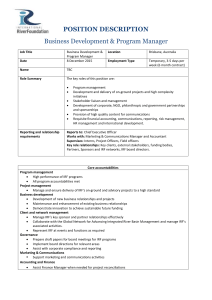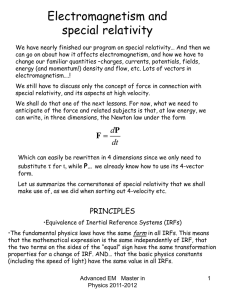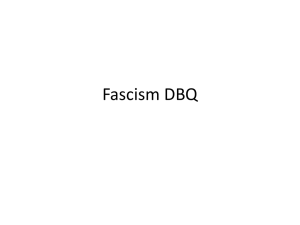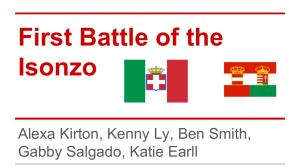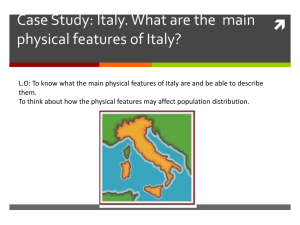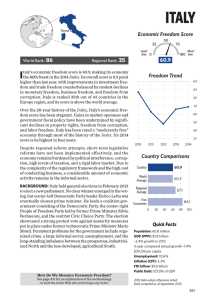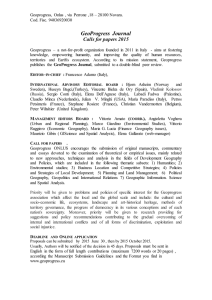The Italian Property Market: A Question of Transparency
advertisement
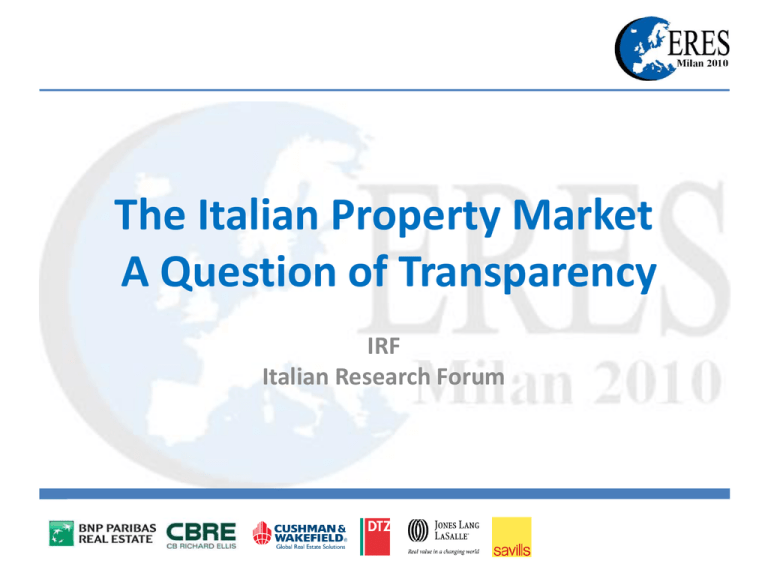
The Italian Property Market A Question of Transparency IRF Italian Research Forum Agenda Introduction to IRF Claudia Buccini, Associate & Head of Research – Cushman & Wakefield Italy A European Lesson: Forum and Network across Europe Susan Trevor-Briscoe FRICS, Associate & Head of Research - Savills Italy IRF: Why, How, Where Valentina Puleio, Research Analyst – BNP Paribas REA Italy IRF Proposed Definitions: Stock, Vacancy, Take-up Rezarta Tasellari, Director & Head of Research – DTZ Italy IRF Proposed Definitions: Prime rent, Prime yield, Pipeline Mirko Baldini, Director – CBRE Italy Conclusion Raffaella Pinto, Senior Research Analyst – JLL Italy Introduction to IRF Italy Research Forum Claudia Buccini, Associate & Head of Research – Cushman & Wakefield Italy Introduction Italian Research Forum (IRF) • The IRF started in 2003 – first approach C&W and JLL • Current and future market trends • Macro level market data • Progressively structured: BNPP RE, CBRE, DTZ, Savills • Property market definitions • Why have we decided to promote the IRF? • Improve market transparency • Professionally respond to our Clients’ requirements • The Italian Property Market: the last ten years • Increasing volume of activity • International players • Credit Crunch Introduction Italian Research Forum (IRF) • Transparency Confidentiality • Improve market transparency • Respect the confidentiality of sensitive information • Sharing information Independency • Open discussion on facts and figures • Company background Interpretation of market trends • Office sector as a starting point • Broader availability of information • Weight in the asset allocation • Retail and Logistics are the next steps A European Lesson Forum and Network across Europe Susan Trevor-Briscoe FRICS – Associate & Head of Research, Savills Italy A European Lesson o Different types of market o Different setups for data exchange o No data-exchange structure required Forums established Informal networks A European Lesson 1. No data-exchange structure required 2. Forums established 3. Informal networks Russia Ire. land UK Nether lands Germany CEE: Poland Ukraine CEE:Czech Republic France CEE: Hungary ITALY Portugal Spain CEE: Romania A European Lesson High transparency – e.g. UK FEATURES o Independent data providers (e.g. EGi, Focus) o Pre-existing co-operational environment o Data collection - Data analysis WAY FORWARD o Weakness - Basic data o Birmingham o Manchester? A European Lesson Good/Average transparency – e.g. Germany (GIF) FEATURES o o o o o o o Structured data exchange organisation Market acceptance and trust Shared definitions Agreed data series Independent publications Training seminars Data collection WAY FORWARD o Expanding membership o Data analysis A European Lesson Low transparency – e.g. Spain FEATURES o o o o o o No formal agreement Quarterly meetings Exchange letting info. Discuss markets Researchers / Agents Partial data collection WAY FORWARD o Formalisation o Extend market coverage o Complete data collection A European Lesson Market maturity and transparency Type of exchange structures o Data exchange Data analysis o Agreed definitions … Data series … Publications … o Privacy o Reliability Confidentiality Market acceptance and trust IRF Why? How? Where? Valentina Puleio, Research Analyst – BNP Paribas REA Italy Italian Research Forum (IRF) The main reasons for lack in transparency : o Young market o No law to publish data o Unwillingness to share knowledge o Competition o Direct transactions o Research “culture” Italian Research Forum (IRF) Why? o Before international real estate firms came in Italy, there were really few official statistics on commercial property-related issues in Italy. o Sources • Public • Private Italian Research Forum (IRF) Our main activity o Quarterly office market reports: • almost all aligned in the content • different according to the client’s distribution method or in the timing of publishing o Letting and sales activity: providing information on: • supply (stock, pipeline, completions, vacancy) • demand (take-up) • values (prime rents, average rents and prime yield) o Covering two markets: • Rome • Milan Italian Research Forum (IRF) How? o Coordinating quarterly meetings • Players exchange information on the office market • Discuss deals and data o Information shared: • Leasing Transactions • Key office indicators and Market views o Confidentiality • Tenant information is not shared by the group if confidential • Only the business sector’s activity is shared o Each company is not obliged to published data shared during the meeting • Data is subject to revision before publishing • However, as for the key data, the gap between agents has been reduced during the years Italian Research Forum (IRF) Where? IRF next steps o In the Short term: • Unique shared glossary for the Italian market • Introduction of agreed rules for the Forum • Involvement of other local real estate companies in the Forum • Extension to other markets, beginning from Rome: some activity has already started in this direction Italian Research Forum (IRF) Where? IRF next steps o In the Medium–Long term: • Agreement on clear geographical definition of markets areas for Milan and Rome • Increase the number of shared items: Investment transactions • Publish an annual press release consisting of market facts and market trends Italian Research Forum (IRF) Market indicators: o Stock o Vacancy o Take Up o Prime Rent o Prime Yield o Pipeline Italian Research Forum (IRF) These are currently characterised as follows: o Independently-determined Market Indicator figures for each company. o Agreement of Market Indicators shared by all IRF participants has not yet been fully achieved. o Quantity and quality of market evidence and other relevant inputs remains variable within the IRF group. o Professional ‘expert opinion’ may differ between companies. IRF Proposed Definitions Stock, Vacancy, Take-up Rezarta Tasellari, Director & Head of Research – DTZ Italy IRF Proposed Definitions : Stock EXISTING STOCK : Total amount (occupied and vacant) of completed office space in buildings mainly used for office purposes within a market as at the survey date (at the end of each quarter period). o Includes: • Commercial and public sector offices • Purpose-built offices • Converted offices (from retail/residential/industrial to office space) o Sources: • No public source for office stock that fits the RE definitions o Weaknesses: • The cadastral definition for “office” is different from the RE definition • It is an estimated value • The information on withdrawal is usually only available in few cases o State of the art: • Each advisor has an ESTIMATED total stock figure • Different methodology and geographical submarkets o Actions: • Share and agree on a unique geographical definition of the market • Census of office building, dividing the Milan market by brokers IRF Proposed Definitions : Vacancy VACANCY : Completed floor space offered on the open market for leasing or sale, physically vacant for immediate occupation on the survey date (at the end of each quarter period). o Includes: • All vacant accommodation inclusive of space for sub-letting o Sources: • Agents’ mapping • Funds’ financial balance sheets • Websites of RE companies o Weaknesses: • Different methodologies to calculate total vacancy • Immediate availability concept • Different geographical submarkets o State of the art: • Each advisor has its vacancy data (different methodology and geographical submarkets) o Actions: • Share and agree on a single geographical definition of the market • Revise and share current property databases IRF Proposed Definitions : Take-Up TAKE-UP: Total floor space known to have been let or pre-let to tenants, or sold or pre-sold to owneroccupiers, during the survey period. A property is deemed to be “taken-up” only when contracts are signed. o Includes: • Also pre-lets/ pre-sales (this refers to a space that was planned or in construction stage). • Lease renewals are counted as take-up with the additional size only. o Sources: • Agents mapping • Press releases and newspapers articles (to be checked/confirmed by the landlords) o Weaknesses: • This definition is still open to the influence of some variations within IRF • Normally is considered as “gross” area and sometimes also includes archive space • The exact taken-up space is often rounded up or slightly increased o State of the art: • Exchange of the list of transactions made by each member’s own team • Maintaining the confidentiality of information o Actions: • To share the “proposed” definition • To co-operate with local brokers in order to increase market knowledge/data • To agree on a single annual take up figure IRF Proposed Definitions Pipeline, Prime rent, prime yield Mirko Baldini, Director – CBRE Italy IRF Proposed Definitions: Prime Rent PRIME RENT: The top nominal (not effective) rent for standard size (>500sq.m) property of highest quality & specification and best location in the market. o Companies’ “market view” constructed by : • Market evidence (transactions closed and asking rents) • Expert opinions o Weakness • Open to the influence of a series of variables (objective and subjective) o State of the Art • Independently-determined Prime Rent figure by each IRF Participant opinion o Action • IRF goals: an agreed IRF Prime Rent on an annual basis, using – a definition – a method different expert IRF Proposed Definitions: Prime Yield INITIAL YIELD: The achievable yield for fully let & immediately income producing property of highest quality & specification and best location in the market. o Source • Rental Income ÷ Purchase Price o Weakness • Gross Yield as market practice in Italy • No relevant transactions Quoted hypothetical yield - expert opinion o State of the Art • Not “fact” but market view by each IRF Participants o Action IRF goals: • improve the transparency of investment volume • not harmonize the overview of Prime Yield Different expert opinion IRF Proposed Definitions: Pipeline PIPELINE: Total amount of floor space for: – All developments under construction and/or – Potential schemes (incl. major refurbishments) in the future o Weakness • No official source of information • Hard to obtain the details & to follow the changes of the project o State of the Art • Independently managed pipeline data/info. by each IRF Participants o Action IRF goals: • Share Office Pipeline • Expand collaboration to include developers and public authorities Conclusion Raffaella Pinto, Senior Research Analyst – JLL Italy Conclusion • What the European experience teaches us • Lack of official statistics across all the countries • Confidentiality is a shared issue • Geographical market definition a key issue to reach consistency • What are the main weakness that IRF is facing in sharing definitions… • Geography issue supply • Quality issue supply • Confidentiality (privacy statement) • Subjective factor influencing definitions • …and achievements reached • Agreement on take up definition • Agreement on the Goal of the Forum • Share increasing number of information's reducing gap Conclusion What are the next steps for IRF? o o o o o Set rules Glossary Geographical definition of market Extend the working group to local players Annual press release on key market data shared within the group A greater involvement from our clients will help the IRF to grow further in order to reach the same goal: market transparency. Conclusion WHAT ’S YOUR COMMITTEMENT TO ACHIEVE A BETTER TRANSPARENCY IN THE ITALIAN MARKET? Conclusion THANK YOU THANK YOU Claudia Buccini, Associate & Head of Research - C&W Italy Susan Trevor-Briscoe FRICS, Associate & Head of Research - Savills Italy Valentina Puleio, Research Analyst – BNP Paribas REA Italy Rezarta Tasellari, Director & Head of Research – DTZ Italy Mirko Baldini, Director – CBRE Italy Raffaella Pinto, Senior Research Analyst – JLL Italy
